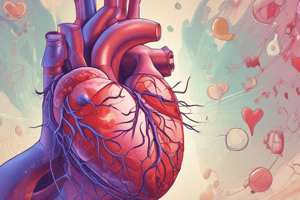Podcast
Questions and Answers
What is the universal definition of heart failure?
What is the universal definition of heart failure?
Heart failure is a clinical syndrome with symptoms and or signs caused by structural and/or functional cardiac abnormality and corroborated by elevated natriuretic peptide levels and or objective evidence of pulmonary or systemic congestion.
Which natriuretic peptide is secreted from the atria?
Which natriuretic peptide is secreted from the atria?
- B type Natriuretic Peptide
- Atrial Natriuretic Peptide (correct)
- C type Natriuretic Peptide
- None of the above
Which of the following conditions is a known etiology of heart failure?
Which of the following conditions is a known etiology of heart failure?
- Ischemic heart disease
- Hypertension
- Idiopathic dilated cardiomyopathy
- All of the above (correct)
Match the following types of natriuretic peptides with their sites of secretion:
Match the following types of natriuretic peptides with their sites of secretion:
Heart failure can only be diagnosed with abnormal findings in cardiac imaging.
Heart failure can only be diagnosed with abnormal findings in cardiac imaging.
What is a common clinical examination finding in heart failure?
What is a common clinical examination finding in heart failure?
Flashcards are hidden until you start studying
Study Notes
Definition of Heart Failure
- Heart failure is a clinical syndrome characterized by symptoms and/or signs arising from structural or functional cardiac abnormalities.
- Diagnosis requires elevated natriuretic peptide levels and evidence of pulmonary or systemic congestion.
Symptoms and Diagnosis
- Diagnosis combines symptoms, elevated natriuretic peptides (ANP, BNP, CNP), and abnormal cardiac imaging findings, typically through echocardiography.
Epidemiology of Heart Failure
- Global prevalence and incidence data indicates significant public health concerns, with various contributing factors.
- Heart failure is associated with rising healthcare demands globally.
Etiology of Heart Failure
- Major causes include ischemic heart disease, hypertension, valvular and rheumatic heart diseases, idiopathic dilated cardiomyopathy, and Chagas cardiomyopathy.
- Cancer treatments can also lead to chemotherapy and radiotherapy-induced cardiomyopathy.
Pathophysiology
- Heart failure involves backward failure from increased left ventricular filling pressures leading to pulmonary congestion.
- Forward failure is characterized by decreased cardiac output resulting in peripheral organ hypoperfusion.
Neurohormonal Activation
- Activation of neurohormonal systems, such as the sympathetic nervous system, exacerbates heart failure symptoms and progression.
- Cardinal features include cardiac and cellular remodeling impacting heart function.
Clinical Examination
- Heart failure requires comprehensive clinical examination focusing on functional status and volume overload signs.
Biomarkers
- Natriuretic peptides and troponin are crucial biomarkers for assessing heart failure severity and identifying cardiac stress.
Imaging Techniques
- Important imaging modalities include chest X-ray, echocardiography, and cardiac magnetic resonance imaging (CMR) to evaluate heart structure and function.
Management
- Management strategies include pharmacological and non-pharmacological interventions tailored to the individual patient's condition and underlying causes.
The Continuous Heart Failure Spectrum
- Heart failure presents as a spectrum influenced by risk factors, comorbidities, and progressive alterations in left ventricular ejection fraction (LVEF).
- Features of heart failure evolve bidirectionally, highlighting the need for continuous and adaptive management approaches.
Studying That Suits You
Use AI to generate personalized quizzes and flashcards to suit your learning preferences.




